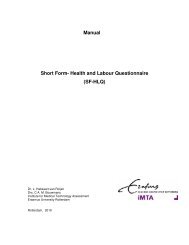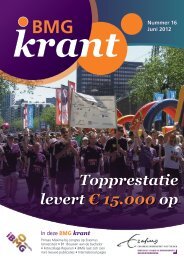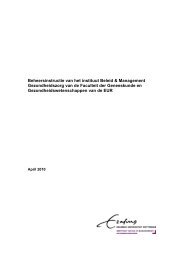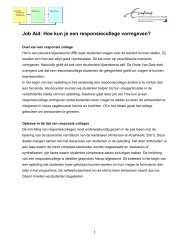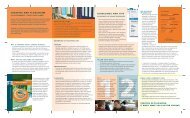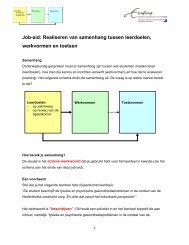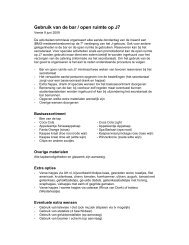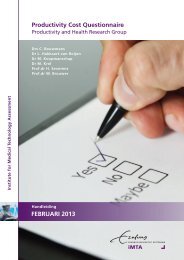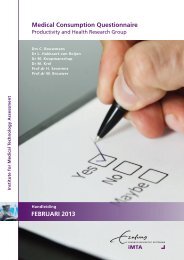148SummaryThis thesis addresses the cost-effectiveness of neonatal surgery. Beginning afterthe Second World War, neonatal surgery has been making enormous progress.Mortality rates for the majority of anomalies belonging to the field fell fromalmost 100% to less than 10%. Contemporaneously with these medicaladvancements came new and pressing dilemmas. First, survival is of course animportant measure of success, but improved survival might come at the price ofpoor health-related quality of life (HRQoL) in later life. Second, the economicconsequences of health care have become larger, in an era where budgetaryrestrictions are becoming tighter. As in other branches of medicine, medicaladvancements contributed to increasing costs in neonatal surgery as well. It isagainst this background of concerns about the HRQoL of the surviving infant andthe increasing costs associated with neonatal surgery that the need forinformation about the cost and effects of neonatal surgery was recognized. Thisthesis directly emerges from these concerns, as explained in Chapter 1. Thischapter, which introduces and motivates this thesis, also explains why costsshould be considered in health care, and clarifies that we will not be able to offercertain medical practices that are known to have favorable effects, but whoseeffects are too small to justify the cost. It highlights the relevance of costeffectivenessanalyses of health care, which aim at establishing whether theeffects of a given treatment are worth the budget needed, compared to analternative treatment. For the case of neonatal surgery, results from costeffectivenessanalyses would make it possible to counteract critiques leveledagainst the discipline. Neonatal surgery has been criticized with arguments ofcost-effectiveness: the high costs of an operation have been feared to come withlow HRQoL after survival. Clearly, the current lack of evidence on the costeffectivenessof neonatal surgery is a main problem worth tackling. It threatensto give the discipline a weaker position in health care allocation decisions.This study's main objective is to collect evidence on the cost-effectiveness ofneonatal surgery and to place this evidence in its proper context. The explicitintention is to include a large group of newborns, to adopt a long-term timehorizon since treatment may have impacts on cost and outcomes basically over apatient's life time, and to study a wide range of relevant costs and effects. So, thestudy does not focus exclusively on the health care costs during the initialhospitalization, as earlier studies often did. Yet, a wide range of other costcategories is assessed, including direct non-healthcare costs (such as out-ofpocketexpenses), indirect health care costs (future costs in added life-years),and indirect non-healthcare costs (productivity costs). Furthermore, the timehorizon will be sufficiently long to capture all significant effects. After all, many ofthe most important outcomes of neonatal surgery, such as language or cognitiveabilities, educational attainment, and adult employment status, aredevelopmentally programmed to occur years if not decades after the intervention.Also, to gain a full understanding of the long-term outcomes of neonatal surgicaldiseases, we will include various outcome measures, such as measures ofsymptomatology and HRQoL, and not only traditional ones such as avoided
Summary 149mortality. Finally, it is intended to consider not only the costs and effectsoccurring to the patients themselves but also those to the parents, whose positionmust not be ignored in cost-effectiveness studies of neonatal surgery. Caring fora child with a major congenital anomaly may have a negative influence on theparents' HRQoL. Also, caregiving may take the parents significant amounts oftime, and may be associated with high out-of-pocket expenses and costsassociated with production losses. Quantitative data to support these perceptionsare however largely lacking in neonatal surgery. Besides its aim to presentevidence on the cost-effectiveness of neonatal surgery, this thesis can serve asan introduction into cost-effectiveness analyses to pediatric surgeons. It will givethem the opportunity to become acquainted with the principles of costeffectivenessanalysis.Chapter 2 presents a full economic evaluation of neonatal surgery andsubsequent treatment for congenital anorectal malformations (ARM). Using thetechnique of cost-utility analysis, the costs and effects of treatment of patientswith ARM are compared to 'no treatment'. Total costs of treatment are calculatedat € 31,593, mainly consisting of direct and indirect medical costs. ARM patientsafter surgical correction suffer considerable stool difficulties and their medicalconsumption is relatively high. The EQ-5D questionnaire, however, shows that theHRQoL of ARM patients is only slightly lower than that of the general population(0.88 v 0.93). Treatment results in a gain of 12.7 quality-adjusted life years(QALYs). Cost-effectiveness (cost per QALY of € 2,482) is good.Chapter 3 contains a cost-utility analysis of treatment for congenitaldiaphragmatic hernia (CDH), closely resembling the methods used in Chapter 2.Total costs—for the most part initial hospitalization costs and indirect medicalcosts—average € 42,658. Productivity losses in both the patients and theircaregivers appear to be minor. Former CDH patients suffer from respiratorydifficulties and stomach aches, even at adult age. According to the EQ-5D,however, their HRQoL does not differ from the general population, suggestingthat these symptoms barely affect overall HRQoL. Treatment yields a gain of 17.5QALYs. Costs per QALY amount to € 2,434, which indicates good costeffectiveness.Chapter 4 covers an in-depth analysis of the short-term and long-term HRQoL ofsurvivors of ARM or CDH. The patients or their parents are administered symptomchecklists and generic HRQoL instruments to find out how the patients are doingcompared to the general population. Many patients appear to retain substantialresidual symptomatology into adulthood. In the youngest ARM patients (aged 1–4years), generic HRQoL is severely affected, but the older ARM patients showbetter HRQoL. In the CDH patients, the influence of symptoms on HRQoL seemsless profound. The instruments used reveal little difference between adultstreated for ARM or CDH and the general population. These results show that forthese two neonatal surgical procedures, improved survival does not come at the
- Page 3:
COST-EFFECTIVENESS OF NEONATAL SURG
- Page 6 and 7:
DOCTORAL COMMITTEEPromotors:Prof.dr
- Page 9 and 10:
PUBLICATIONSChapters 2 to 7 are bas
- Page 11:
6ChapterINFORMAL CARE FOR CHILDREN
- Page 14 and 15:
2Chapter 11.1 BACKGROUND AND MOTIVA
- Page 16 and 17:
4Chapter 1provides a good overview
- Page 18 and 19:
6Chapter 1disability, and death of
- Page 21:
Introduction 9particular equity pri
- Page 25 and 26:
Introduction 1320. Oostenbrink JB,
- Page 27 and 28:
Introduction 1554. Heyman MB, Harma
- Page 29 and 30:
THE COST-EFFECTIVENESS OFTREATMENT
- Page 31:
Cost-Effectiveness of Treatment for
- Page 35 and 36:
Cost-Effectiveness of Treatment for
- Page 37 and 38:
Cost-Effectiveness of Treatment for
- Page 39 and 40:
Cost-Effectiveness of Treatment for
- Page 41 and 42:
Cost-Effectiveness of Treatment for
- Page 43 and 44:
Cost-Effectiveness of Treatment for
- Page 45:
Cost-Effectiveness of Treatment for
- Page 48 and 49:
36Chapter 3ABSTRACTBackground/Purpo
- Page 50 and 51:
38Chapter 33.2 MATERIALS AND METHOD
- Page 52 and 53:
40Chapter 3child's date of birth) a
- Page 54 and 55:
42Chapter 3diaphragm was closed (Ta
- Page 56 and 57:
44Chapter 3Total costs of treatment
- Page 58 and 59:
46Chapter 3Regarding the treatment
- Page 60 and 61:
48Chapter 3REFERENCES1. Stolk EA, P
- Page 62 and 63:
50Chapter 332. Jaillard S, Pierrat
- Page 64 and 65:
52Chapter 4ABSTRACTAims:To examine
- Page 66 and 67:
54Chapter 4Outcome measuresThe pati
- Page 68 and 69:
56Chapter 4Clearly, the symptoms st
- Page 70 and 71:
58Chapter 4The respondents did not
- Page 72 and 73:
60Chapter 4Table 4.4TAIQOL Scores o
- Page 74 and 75:
62Chapter 44.4 DISCUSSIONIn this pa
- Page 76 and 77:
64Chapter 4ACKNOWLEDGMENTSWe are in
- Page 78 and 79:
66Chapter 418. Coons SJ, Rao S, Kei
- Page 80 and 81:
68Chapter 5ABSTRACTObjective:Extrac
- Page 82 and 83:
70Chapter 5treatment. 26,27 Finally
- Page 84 and 85:
72Chapter 5CostsOnly direct costs w
- Page 86 and 87:
74Chapter 5summarized in Table 5.2.
- Page 88 and 89:
76Chapter 5Table 5.3 Direct Medical
- Page 90 and 91:
78Chapter 5Figure 5.3 illustrates o
- Page 92 and 93:
80Chapter 5severely ill newborns—
- Page 94 and 95:
82Chapter 5REFERENCES1. Bartlett RH
- Page 96 and 97:
84Chapter 533. Meinert CL: Extracor
- Page 98 and 99:
86Chapter 568. Hui TT, Danielson PD
- Page 100 and 101:
88Chapter 6ABSTRACTObjective:To inv
- Page 102 and 103:
90Chapter 6a rule. The health-relat
- Page 104 and 105:
92Chapter 6Regression analysis of h
- Page 106 and 107:
94Chapter 6that caregiving for thei
- Page 108 and 109:
96Chapter 6Table 6.5 CareQol Compar
- Page 110 and 111: 98Chapter 6children with a disabili
- Page 112 and 113: 100Chapter 6This study was of impor
- Page 114 and 115: 102Chapter 618. Poley MJ, Stolk EA,
- Page 116 and 117: 104Chapter 654. Boman KK, Viksten J
- Page 118 and 119: 106Chapter 7ABSTRACTMortality rates
- Page 120 and 121: 108Chapter 77.2 THE RELEVANCE OF CO
- Page 122 and 123: 110Chapter 7In the early 2000s, our
- Page 124 and 125: 112Chapter 7Table 7.1 Economic Eval
- Page 126 and 127: 114Chapter 7More from a policy pers
- Page 128 and 129: 116Chapter 7also expect that life-s
- Page 130 and 131: 118Chapter 7entirely justified, for
- Page 132 and 133: 120Chapter 723. Sydorak RM, Nijagal
- Page 134 and 135: 122Chapter 765. Glaser AW, Davies K
- Page 137 and 138: GENERAL DISCUSSION:A GUIDED TOURPRO
- Page 139 and 140: General Discussion: A Guided Tour P
- Page 141 and 142: General Discussion: A Guided Tour P
- Page 143 and 144: General Discussion: A Guided Tour P
- Page 145 and 146: General Discussion: A Guided Tour P
- Page 147 and 148: General Discussion: A Guided Tour P
- Page 149 and 150: General Discussion: A Guided Tour P
- Page 151: General Discussion: A Guided Tour P
- Page 154 and 155: 142GlossaryCharge (or: tariff)A pri
- Page 156 and 157: 144Glossaryefficient one. We are th
- Page 159: SUMMARY
- Page 163 and 164: Summary 151neonatal surgery. It is
- Page 165 and 166: SAMENVATTING
- Page 167 and 168: Samenvatting 155zoals directe niet-
- Page 169 and 170: Samenvatting 157Hoofdstuk 6 gaat ve
- Page 171: Samenvatting 159vereisen, waarvoor
- Page 174 and 175: 162AcknowledgmentsAlthough I am ind
- Page 176: About the AuthorBorn in De Meern (N



